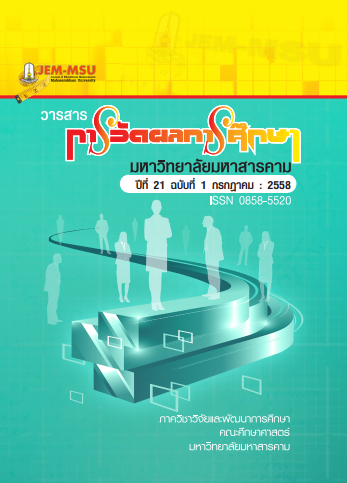The Factors Influenced to Analytic Thinking of Prathomsueksa 6 Students, Under The Office of Nakhonratchasima Primary Educational Service Area Zone 5
Main Article Content
Abstract
An analytic thinking is the essential capability in cognitive learning, that
enhanced for capable thinking, problem solving and applying in real life. The purposes
of this study were : 1) to study the relationships of learning climate, attitude toward
learning, achievement motivation, intellectual quotient, encouraging behaviors in
analytic thinking, and future attending, those effected to analytic thinking of
Prathomsueksa 6 Students, under the Office of Nakhonratchasima Primary Educational
Service Area Zone 5. The sample used in this study consisted of 700 Prathomsuksa 6
students from 78 schools, under the Office of Nakhonratchasima Primary Educational
Service Area Zone 5, which obtained using multi – stage random sampling technique.
The independent variables in studying were; learning climate, attitude toward
learning, achievement motivation, intellectual quotient, supportive behaviors in
analytic thinking, and future attending, and dependent variables was analytic thinking.
Those of variables measured from observable data, which were included of 25
variables and obtained by using two kinds of instruments, consisted of (1) two test
form with four multiple choices, were 35 items of intellectual quotient test and 15
items of analytic thinking test, and (2) rating scale with 5 points which composed of
five aspects of learning climate, attitude toward learning, achievement motivation,
encouraging behavior on analytic thinking, and future attending. The statistics used for
analyzing research data were Pearson Correlation, test for congruence of model, test
for harmonization, and analyzing model of constructive equations.
The results of the study were as follows :
1. The factors influenced to analytic thinking of Pratomsuesa 6 students
under the Office of Nakornratchasima Primary Educational Area Zone 5 were;
1.1 Learning climate was not factor influenced directly to analytic thinking,
but had positive influenced indirectly on learning attitude at 0.28, with the .05 level of
significance, and furthermore, had positive influenced indirectly on achievement
motivation at 0.93, with the .01 level of significance.
1.2 Learning attitude was summative influenced positively to analytic
thinking of the students at 0.14, with the .01 level of significance.
1.3 Achievement motivation was summative influenced positively to
analytic thinking of the students at 0.36, with the .01 level of significance, and indirect
influenced positively to learning attitude at 0.36, with the .01 level of significance.
1.4 Intellectual Quotient was summative influenced positively to
analytic thinking of the students at 0.57, with the .01 level of significance, and indirect
influenced positively to learning attitude at 0.205, with the .01 level of significance.
1.5 Encouraging behaviors on analytic thinking in classroom, was
summative influenced positively to analytic thinking of the students at 0.01, with the
.05 level of significance.
1.6 Future attending was not influenced to analytic thinking of the
students.
2. The result of analyzing harmonization of factors model, which influenced
to analytic thinking, of Pratomsuesa 6 students under the Office of Nakornratchasima
Primary Educational Area Zone 5, with empirical data after model adjustment, were
found that adjusted model was congruence with empirical data, those had chi-square
at 199.01, df=170, p-value = 0.06, CFI= 0.99, TLI = 0.99, RMSEA = 0.01, and SRMR =
0.02. So that, all of independent variables capable incorporated to explain the
variance of analytic thinking abilities of the students.
In conclusion, attitude toward learning, achievement motivation, intellectual
quotient, encouraging behaviors on analytic thinking, were correlated with the student’s
analytic thinking. Therefore, the teachers should encourage those characteristics for
nurturing the students were keen, good, reasonable, opened mind, self faithful and
others, enthusiastic in solving problems, and capable in taking their life happily.
Article Details
The content and information contained in the published article in the Journal of Educational Measurement Mahasarakham University represent the opinions and responsibilities of the authors directly. The editorial board of the journal is not necessarily in agreement with or responsible for any of the content.
The articles, data, content, images, etc. that have been published in the Journal of Educational Measurement Mahasarakham University are copyrighted by the journal. If any individual or organization wishes to reproduce or perform any actions involving the entirety or any part of the content, they must obtain written permission from the Journal of Educational Measurement Mahasarakham University.


